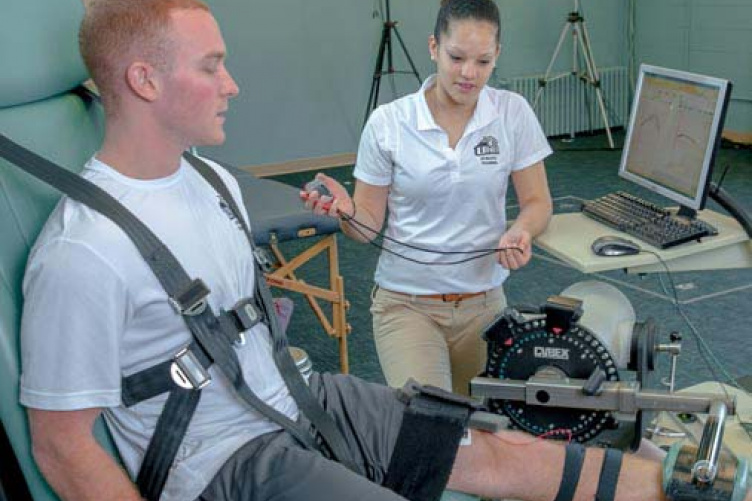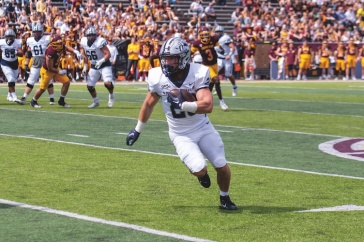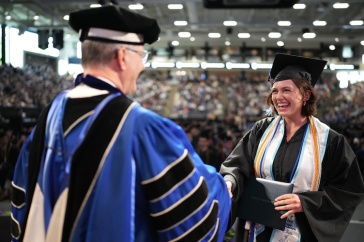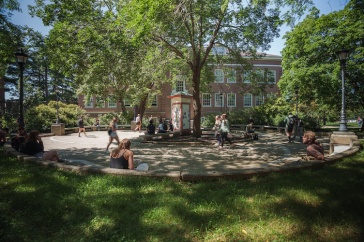
Amber Craft ’15 demonstrates how she measures muscle fatigue for her research project. Classmate Jimmy Golden ’14 volunteers as the test subject.
Amber Craft ’15 looks up from the computer and says, “Hear that sound? That’s the muscle crunching. The electrodes just pick it up and it plays on the computer.” A classmate has volunteered as a test subject to demonstrate how Craft, an athletic training major, conducted research this past summer in the Biomechanics and Motor Control Laboratory.
With electrodes taped to the subject’s leg, Craft can measure the physiological changes of muscle fatigue that occur during exercise. In this case, the subject does leg extensions and flexions and, she notes, the settings are not low.
“I tested 12 subjects last summer—all males,” says Craft. “And everyone was like ‘oh this is intense!’”
Craft’s research compares two methods of measuring muscle fatigue through analyzing electromyography frequency content from the muscle – one is called Fourier transformation (FT) and the other is a time-frequency analysis called wavelet transformation (WT). Although the WT technique is extremely accurate and superior to FT, more research is needed to confirm these findings. Craft’s findings will contribute to the literature in this important area of neuromuscular research. The mathematical program for the WT analysis used in her study was jointly developed by the Kinesiology and Electrical and Computer Engineering Departments at UNH.
From Hyde Park, Mass., Craft came to UNH because she loved the campus and the program had a lot to offer.
|
Amber Craft ’15 consults with her faculty mentor, Professor Ron Croce. |
“When I came as a first-year student, I was in the Connect Program, an orientation program for minority students,” says Craft. “A lot of the students were in the McNair Scholars Program and they stressed getting to know your professors. So, I applied to the First Year Program and thought, ‘I’ll stick with this for a year and see if I like it.’”
A year later, Craft found that athletic training was indeed the right major. By the middle of her sophomore year, she found that she did want to pursue research. She had talked to most of her professors about what they were researching, and when she met Professor Ron Croce, she knew that it would work out.
“Right from the beginning, it was very relaxed,” says Craft, “and that made learning easy.”
She took INCO 590, Student Research Experience, which is designed as an entry-level apprenticeship to assist students in developing research skills and to prepare them for more advanced research. Working with Croce, Craft wrote the proposal for the literature review. Soon, building on some of Croce’s nationally known research in neuromuscular functioning, “we came up with the full proposal,” says Craft.
After testing subjects over the summer, they sent their data off to the Tufts University statistics department for super-crunching.
Already, Craft has presented her proposal at a McNair luncheon in Maryland. There she also met with various graduate school recruiters and learned about a broad range of programs in exercise science.
Now, by the end of March, more than 10 pages of data has arrived full of graphs and statistical findings.
When Croce comes into the lab, the two of them naturally fall into a conversation about how to write the conclusion. “It’s going to take at least a week,” says Croce.
Right now it will be great to get this first paper done so she can present it in full at the Undergraduate Research Conference on Friday, April 25. By next fall, she’d like to have another paper published as well. Their discussion naturally leads to graduate school. Next fall, Craft is planning to apply to master’s degree programs in exercise science and athletic training.
As for the present, on top of her research Craft couldn’t resist volunteering to coach women’s softball at Oyster River High School. She smiles and says, “I work well under pressure.”
Originally published by:
UNH Today
-
Written By:
Staff writer | Communications and Public Affairs

















































